By Elaine Viets
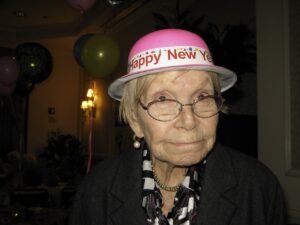 See this woman? I’m sure you have. She’s been featured in a slew of ads. Aw, what a cute old lady.
See this woman? I’m sure you have. She’s been featured in a slew of ads. Aw, what a cute old lady.
I loathe the old bat. Her harmless cuteness stereotypes seniors and makes it easy to dismiss older people. Thanks to her, anyone over sixty seems powerless and a bit simpleminded. She may be a fine person in real life, but I don’t like how her stock photo is used.
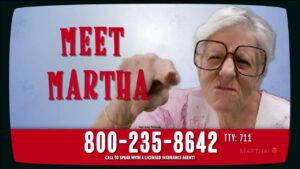
Crazy old cranks. How about this woman known as “Cranky Martha.” You’ve seen her in the Medicare ads. Martha’s another stereotype – an old woman who grumbles about Medicare programs. Martha is denied the dignity of righteous rage. Dealing with government phone lines and websites should make anyone angry. They can eat up your whole day. But poor Martha is just another complaining, crazy coot.
Like many baby boomers, I’m old enough to get Social Security. I’m also concerned about how older people are portrayed. Older people are cute, cranky, sexless and downright weird.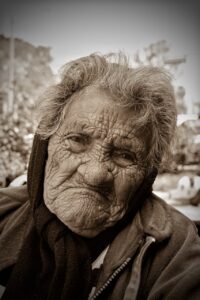
How many of these demeaning stereotypes are perpetuated in our books?
Even the language I’m using to describe these people is disrespectful: coot, crazy, old crank, old bat. All those words diminish older people.
Here are a few more stereotypes: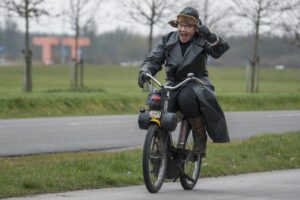
The old weirdo. This person is often found in cozies, dressed in loud clothes and behaving like a silly 16-year-old. Margery, the 76-year-old landlady in my Dead-End Job mysteries, skirted the edges of this stereotype. But I tried to keep her smart and sometimes downright scary.
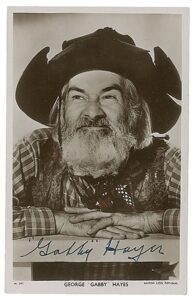
The male version is the wacky old guy who is the hero’s sidekick, a popular Western trope. Remember Gabby Hayes, the grizzled old codger who tagged along after John Wayne, Roy Rogers, Gene Autry, and Hopalong Cassidy?

The foreign old weirdo. Heaven help an old person who lives in a poor country, like this Cuban woman smoking a cigar. Photographers flock to photograph their wrinkles (apparently poor people can’t afford moisturizer). Writers condescend to them and their customs.
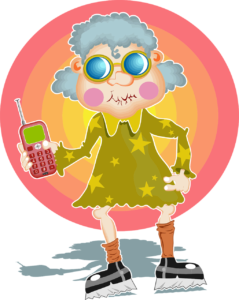
The old technophobe. Yes, it’s true. Some older people have trouble with cell phones and other tech. There’s a reason for that. Parts of the brain shrink with age and communication between neurons slows. This makes it tough for some older people to learn new technology.
Some. But not all.
It’s true I still long for the return of the five-button phone in offices, but I can use a cell phone. Alan Portman, a regular reader of this blog, is my main IT person, but when I need someone local, I use a sixty-something grandfather with his own business. His brain works just fine, thank you.
Growing old disgracefully. That’s the motto for a lot of boomers. They love to tease their staid children.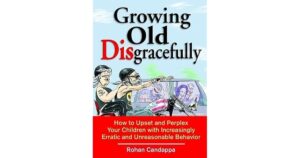
The old stereotypes are outdated. Older people are not the old fogies of yesteryear. They are active, well-educated, and entrepreneurial. Empire-builder Martha Stewart was on the cover of Sports Illustrated at age 81.
Seventy-year-old Christie Brinkley looks damn good in a bikini.
Older people are powerful. Associate Supreme Court Justice Ruth Bader Ginsburg held office until her death at age 87.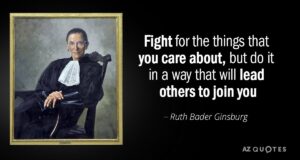
So how do you portray old people in your mysteries? Are they one of these stereotypes, or realistic characters? Are your older people like Miss Marple, who are underrated because of their age, but use it to their advantage? Or are they fierce and vital?

Deadly secrets in a crypt. The Dead of Night, my 7th Angela Richman mystery, is on sale here: https://tinyurl.com/2c4qzlb6

Love this post! Thanks for addressing the issue.
I get so upset when I see older characters portrayed the way they so often are. I am on the other side of three-quarters mark, and as a self-taught computer person, I teach older people how to navigate smart phones and computers.
I’ve learned the main problem older people have is from not using the technology every day.
I always have older characters in my books and they’re always feisty and independent and give the protagonist words of wisdom. In Fatal Witness, the book that releases in February, my 78-yr-old potter has a crime board that the local sheriff borrows.
Yes! You’re changing the stereotype one book at a time.
Elaine, I ascribe to the saying: “Old age and treachery will overcome youth and skill every time.”
I wrote a short story titled “Invisible” about three Boomer women friends who are ignored by everyone around them–a driver nearly runs them down as they cross the street, people on the sidewalk plow through them, the server at the coffee shop ignores them, etc. Two bemoan their invisibility. The third bets them $100 that she can prove they aren’t invisible. She then proceeds to talk about committing a murder until everyone in the coffee shop falls dead silent, listening.
Give us the name of that story, Debbie. I’d love to read it.
Title is “Invisible.” It was selected for an anthology but I withdrew b/c of contract problems. So it hasn’t been published. Sent it to AHMM many months ago. Not holding my breath.
Fingers crossed it’s sold soon, Debbie.
The older I get, the more I dislike age stereotypes. For someone to be “old” they have to be older than I am, and that pool of characters is shrinking. My mom lived to be 96, and was active into her early 90s. She and my dad were waterskiing until their 60s. They gave it up because not enough of their contemporaries could join them anymore. I called an author to task when I beta read a few of his chapters as portraying a 65-year-old woman in stereotypical “old lady” fashion.
Rose and Frank Kretzer are characters in my Mapleton series. They’re in their late 70s, and nobody messes with Rose. Likewise, Horace and Grace in my Blackthorne series. Maggie in my Pine Hills series isn’t quite as old, but that’s because I wrote Finding Sarah almost 20 years ago, and I was younger then, so at the time, she was older than I was.
You’ve hit some buttons here, Elaine! Good post.
Thanks, Terry, and I’m glad you took that author to task. Hope he changed his novel.
Great post, Elaine. I agree with Patricia – I love this post, and thanks for addressing the issue.
When it comes to using skills that are manual, require knowledge from the past, and maybe even some real physical work, the young (finger tapping) generation is often lost if they can’t accomplish it on their phone. I know a young man who had to hire someone to put up his Christmas lights. Someday, when the grid goes down, those finger tappers will come looking for those of us who have really lived to ask us how to do things.
In my teen fantasy series, The Mad River Magic series, the source of wisdom for the young protagonists are Gram and Gramps, and a wizard from 200 years ago who owns a copy of the Book of Knowledge.
Thanks, Elaine. I hope your day is filled with appreciation for your wisdom.
Now if we could just do something about that Medicare ad. Is our tax money financing that insulting stereotype?
Terrific post, Elaine. Thanks for tackling stereotypes around age in our modern culture. In my 32 years working in public library, I met, helped, and worked with a wide variety of older people, including my first supervisor, who my first mystery is dedicated to.
I’ve known a few cranky older people, but once you get to know them, the crankiness turns out to have been situational. I’ve also known fierce, determined, kind, giving, sharp, witty, and wise older people. Many love a good joke. Many volunteered.
There was one who became an intellectual hero of mine, a elderly Russian man who immigrated to the US after the Cold War, who learned English and had an enduring love of reading in both languages, and an incredible determination to learn about everything. Even after becoming wheel chair bound following a stroke when he was 90, he’d come into the library with a twinkle in his eye and wanting help in locating books, often elsewhere, on numerous topics.
I do have a nasty older woman in my first mystery, but I also have a wise, kind mentor of sorts to my hero, Meg. Then there’s the members of the Murder of the Month library mystery book club, and others. I’m looking forward to showing more vitality, determination, generosity of spirit etc in my older characters as the series progresses.
What an interesting series. That Russian man sounds amazing.
When new writers ask me how to write a character outside of their own experience, I always say to write them as people. Everything else is window dressing.
The stereotype has value for writers. It’s short hand for a character who shows up once or twice for a specific task/role then disappears. The reader doesn’t need an extremely quirky older woman who requires lots of pages to be established as a personality when all she does is chew gum and deadpan sarcasm as she takes the hero and his partner’s order at the diner near the station. If this is a series, she’ll grow for the reader as more layers of personality are shown until the audience loves her so the nasty writer can kill her. “Nooooo, not Gladys!”
LOL. You are an inspiration, Marilynn.
Great post, Elaine! The older folks in my books are known for their wisdom and common sense. There’s not a weirdo in the bunch.
However, Cece, one of my main characters in the Watch Mysteries, is an actress who likes to go undercover. In one book, she disguised herself as an eccentric author who was writing her first novel. 🙂 Garish clothes, drippy earrings, and orthopedic shoes. I’m not sure how old Cece was trying to appear to be, but said author might be eligible for social security.
You’ve given me an idea for a future plot, though. I sat in a class recently where the instructor, a man in his 30’s, said he couldn’t read a map. He just uses GPS. If we ever want to stage an elder revolution, we can use maps, analog clocks, and cursive writing to communicate.
My part time job is delivering pizza. I started with “game piece” pizza when it was 30 minutes or free and the only people using GPS were the Air Force. I learned the streets.
I drive rings around the kids now because I can drive to your house without asking my phone if I should take a left or right out of the store.
Right on, Kay. As long as you bring back the 5-button phone.
“Alan Portman, a regular reader of this blog, is my main IT person” will need 61 birthday candles in a few weeks. 🙂 I don’t snapchat very well. My children help with that.
My grandfather used to volunteer at a hospital. He did patient transport, read mail, and such. He was quite upset. The hospital made him stop pushing wheelchairs when he turned 80.
One of my high school classmates says, “I am a Boomer.” with pride. The Navy put him on an Ohio class submarine, a Boomer.
Great post!
I second your loathing of that ridiculous MCR ad. I think whoever came up with it, and those who approved it should be sentenced to be 15 for the rest of their lives. 🤓
I’d like to sentence the people who approved the MCR ad to be 75 for the rest of their lives. See how they like being portrayed that way.
Well said, Elaine! As a senior myself, I’m glad the tide is turning with regards to the portrayal of elderly people, especially “old ladies.” Older women are speaking up in increasing numbers against those demeaning stereotypes. Yay! Thanks for adding your voice to this enlightened movement! 🙂
Older women now have more power, Jodie, personally and professionally to fight back. And we should.
Over my many years, I’ve watched a number of people growing old. I eventually realized that often their behavior has nothing to do with their being old. If someone I don’t know does something unusual, whether it’s a personality thing or a driving mistake or whatever, I have a tendency to attribute that to their being old. But then I realized that people I’ve known for a long time are doing such things and it’s just who they are–who they’ve been as long as I’ve known them. If 85-year-old Karl makes a wrong-way turn into a one-way street, chances are he would have done that when he was 45.
What I’m trying to say is that it’s easy to attribute a behavior to a stereotype when it is, maybe in most cases, just who the person has always been. Sure we change. Our reflexes may be slower. Our memory may require more work, more reinforcement. Our ability to sprint after the bad guy may now compete with the turtle. But for the most part we’re the same person we’ve always been.
Something for novelists, at least, to remember.
Thanks for the column, Elaine.
Good point, Eric. And few people improve with age.
Time for us seniors to prove we are still mighty and functional.
I’, writing a series of short stories where older women avenge crimes against other women. I got the idea thinking about that concept that we’re invisible. We are not if we don’t allow it. But if others think we are, maybe we can get away with murder!
Go for it, Aimee. Looking forward to reading those.
When I was 13 years old, I lived with my 77 year old grandmother out on the central plains. The nearest paved road was miles away. She was every bit of a pioneer woman then as she was when she crossed the Red River from Texas into Indian Territory during her late teens. Her everyday skills would be considered advanced survival skills in the present day. I learned a lot from this old woman during my time with her.
She had prodigious negotiating skills. When her oldest daughter sought refuge from an abusive husband and he showed up at my grandmother’s doorstep to force his wife to come back with him, my grandmother easily talked him out of that notion.
Of course it might have had something to do with the 30-30 Winchester she had shoved halfway up his nose. She also told him how she planned to dispose of him body. She would put it in a Red Rider wagon and dumping it in a nearby gully. Then clear her outhouse pit and deposit it on his resting place to insure his body decomposed quickly. Nobody will search in poo anyway.
I learned a valuable lesson. Don’t mess with grandma.
That event became the family legend of “The Two Legged Wolf.”